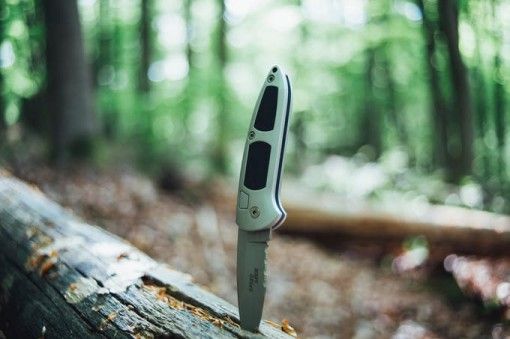While going for hunting or other outdoor sports, a hunting knife is one of the most important tools you must have. A good quality knife will make your hunting experience hassle-free.
As you may already know, most fishing and hunting knives are made of carbon steel or stainless steel. Choosing one or the other may be difficult or confusing because each type of blade has an advantage over the other.

In one case, you may compromise toughness for hardness, and in the next, you'll get an excellent, rust-resistant knife that's hard to sharpen and doesn't hold its edge.
These back and forth advantages and disadvantages can be very frustrating when you're trying to choose a good quality knife that will last as long as you need it.
High carbon steel knives are a trendy choice in the hunting world, but they do have one very distinct disadvantage that some hunters won't tolerate—corrosion.
These knives rust very quickly and require special care if you want them to last. You'll have to coat them regularly with silicon wax, but even then, they're still prone to corrosion.
These knives are a much better choice for someone who periodically hunts, as using them is one of the best defenses against rust. That can be a problem during the off-season, mainly if you don't store them correctly.
On the plus side, carbon steel knives hold their edges well and are much easier to sharpen. Now that's an advantage! So, if you don't mind taking special care of a knife, on a more than regular basis, and are all for the idea of a blade that's easy to sharpen and doesn't get dull as quickly as other knives, carbon steel is for you.
When you get right down to it, most stainless steel knives have advantages and disadvantages that are exact opposites of the carbon steel ones.
They tend to cost more than carbon steel, probably because of their comparatively high rust resistance. If you have any stainless steel utensils and cooking apparel in your kitchen, you may have noticed that they clean very well, seem to have a never-ending shine, and last long.
Picture roughly the same thing with a stainless steel knife. One downside with stainless steel is that it doesn't hold its edge well, which for the big bucks you often fork out should.
These knives are often a real pain to sharpen and can go dull when you need them most—while you're skinning the animal. If you choose this type of metal, one way to combat this very inconvenient and intolerable disadvantage is to bring a sharpening tool into the field.
Which sharpening tool you choose is up to you, but some are more practical for sharpening in the field than others.
Once you've decided which metal type you want, you would choose a knife that best suits your needs. Do you want something that does it all?
Or would you be okay with one for the dressing and one for the skinning? Will you be capping a deer?
If you go off on a hunting trip with different plans in mind and your knife doesn't do all the things you thought it was supposed to, you've run yourself into a problem.
Before choosing a knife, know what you will be using it for to not run into issues in the field.








*********s22223344@gmail.com
I appreciate the thought-provoking nature of your articles, which explore the intersection of technology and society and its impact on our lives.bear coat